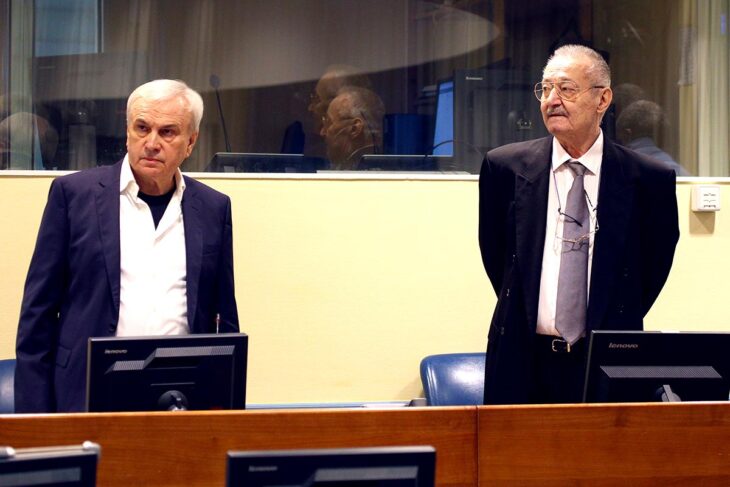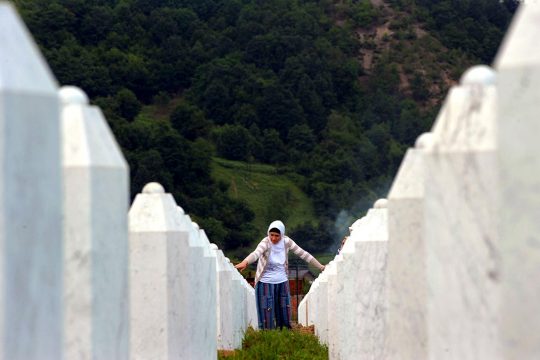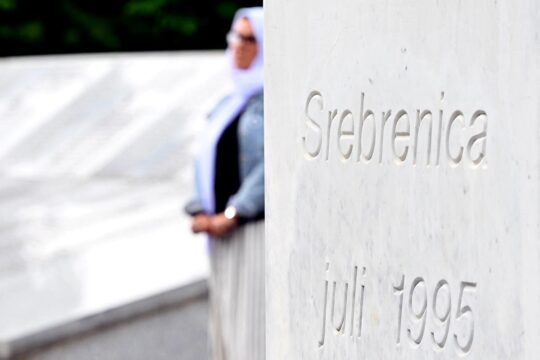The presiding judge called the appeals decision a “milestone” at the outset of the hearing. Before a full public gallery in The Hague on May 31, judges from the International Residual Mechanism for International Tribunals ordered former head of Serbian state security Jovica Stanisic and his subordinate Franko ‘Frenki’ Simatovic to spend an additional three years in custody after widening their culpability for ethnic cleansing and atrocities under the regime of then Serbian president Slobodan Milosevic. The septuagenarians are the only Serbian state officials convicted of war crimes and crimes against humanity committed in neighboring Bosnia and Croatia during the 1990s conflicts that followed the collapse of Yugoslavia.
The five-judge partially upheld an appeal from the prosecution, finding the men guilty of participating in a joint criminal enterprise, replacing their previous conviction for aiding and abetting. They rejected all appeals from both defense teams. The decision brings to an end the longest-running war crimes trial in The Hague, and the last one inherited from the International Criminal Tribunal for the former Yugoslavia (ICTY), a court created by the United Nations in 1993 and replaced twenty years later by the “Mechanism”.
Acquitted ten years ago
Stanisic and Simatovic were first charged and arrested in 2003. They were picked up by Serbian police during Operation Sabre, the investigation into the assassination of prime minister Zoran Đinđić, who was killed by a gunshot to the chest in Belgrade that year. The gunman was an ex-member of the Special Operations Unit, which Stanisic oversaw.
UN Prosecutors accused the duo of organizing, arming, training and financing some of the most notorious Serb militias operating in Bosnia and Croatia between 1991 and 1995, including the paramilitary groups known as the Scorpions and the Tigers. After a four-year trial before the ICTY, they were acquitted in 2013. The judges ruled that while the crimes charged in the indictment did happen, the accused could not be held legally responsible for them because there was no evidence that the orders they issued were “specifically directed” at aiding the commission of the crimes.
It was a blow to the Office of the Prosecutor that had unsuccessfully tried for years to establish the criminal responsibility of Serbia in the Balkan wars. In 2006 Slobodan Milošević, Serbia’s president during the conflict, died of a heart attack in the ICTY detention facility in the midst of his trial. “The death of Milošević represents for me a total defeat,” the tribunal’s chief prosecutor at the time, Carla Del Ponte, told Italian newspaper La Repubblica. Then early 2013 the head of the Serbian armed forces during the conflict, Momčilo Perišić – who was initially found guilty of war crimes and crimes against humanity – was acquitted by the Appeals chamber.
An appeal, a retrial, and another appeal
The prosecution appealed the first instance acquittal of Stanisic and Simatovic. It convinced the appeals chamber that the earlier ruling had significant legal errors. However the judges took an unprecedented decision: instead of issuing a new decision they ordered an entirely new trial. It was even more consequential, at least financially, that after two decades in operation, the ICTY had been ordered by the UN Security Council to close shop.
The retrial opened before the tribunal’s successor institution, referred to as the “Mechanism” for short, that took over the pending cases and post-trial responsibilities from both the ICTY and the International Criminal Tribunal for Rwanda (ICTR). The second trial lasted another four years, dragging some 80 aging witnesses back to The Hague to testify. It was interrupted by the Covid-19 pandemic and Stanisic’s ailing health. Both accused were largely absent from court, having been granted provisional release. In 2021, the men were convicted on some the charges. They were found guilty for “aiding and abetting the commission of crimes in Bosanski Samac” in Bosnia but not held responsible for crimes in four other Bosnian municipalities and several towns and villages in Croatia.
Both sides appealed. And while the earlier conviction found the men guilty of aiding and abetting a limited number of crimes by training the paramilitary groups who would go on to commit them. the appeals decision comes with a new “joint criminal enterprise” conviction that connects the men to the broader plan to drive out the majority of the non-Serb population from Serb-claimed areas of Bosnia and Croatia.
The Mechanism’s current chief prosecutor, Serge Brammertz, was pleased with the decision. It shows that “political leadership from neighboring countries there, in particular from Belgrade, were involved in the planning of those large ethnic cleansing campaigns,” he said to a crowd of journalists outside of the courtroom.
“An expeditious trial is a human right,” said Stanisic’s lawyer Wayne Jordash, speaking to Justice Info after the ruling was announced. The legal battle in this case hit the 20-year mark and the men have now spent more than a quarter of their lives fending off the charges. Critics of the proceedings, including Jordash, also argue that the ICTY was desperately trying to connect the Serbian authorities in Belgrade to the crimes committed against non-Serbs across the border. “There was an unhealthy desire to ensure Belgrade Serbs are indicted,” Jordash said.
Having already served 7 years, the convicts should stay in jail for another three years before being able to apply for early release.
Political tensions back on the rise
From a legal perspective, the new conviction is “quite a substantial change,” University of Utrecht historian Iva Vukusic told Justice Info. Whether that will change opinion in the region remains to be seen. “I don’t think it changes the narrative,” Vukusic said. The court is viewed very skeptically in Serbia, where many of these men are seen as war heroes. Nationalistic politics and tensions are back in the former Yugoslavia, as shown by recent violence in Kosovo.
For some victims, however, the distinction is a meaningful one. “This verdict showed that Serbia is responsible, and we know that it is,” Munira Subasic, who is part of the activist group known as the Mothers of Srebrenica. The women, many now in their 70s and 80s, have been a fixture at the court throughout the proceedings. They represent the thousands of survivors of the siege of Srebrenica, including the mass murder of about 8,000 Bosnian Muslim men that was declared a genocide by the ICTY.
And now what’s the Mechanism for?
These last two convictions brings 30 years of international justice in the region to 93 convictions out of 161 people the ICTY indicted. It also leaves the Mechanism with only one pending trial, that of Rwandan Félicien Kabuga. The alleged financier of the 1994 genocide in Rwanda was arrested in Paris in 2020 after more than 25 years on the run. However the proceedings were put on hiatus in April after the octogenarian was found by three medical experts to be too ill to continue with his defense. A decision to stop the trial or to continue it without the accused – which would be another extraordinary first in such circumstances – has been pending for two months.
Police in South Africa arrested former Rwandan police officer Fulgence Kayishema last week on a warrant from the ex-ICTR. But Kayishema is ultimately expected to face justice in Rwanda, not before the Mechanism.
According to Brammertz, the Mechanism’s $79 million budget for 2023 will now be focused on supporting the pursuit of justice in the regions. “Our priority will now be to really support our colleagues in the region and the survivors and victims to make sure that they see ultimately justice being done at the domestic level,” he said.








